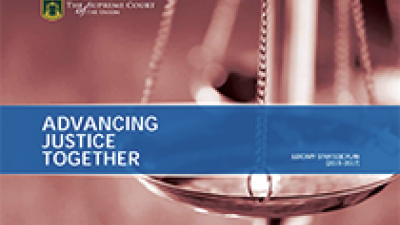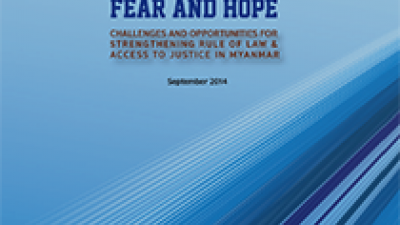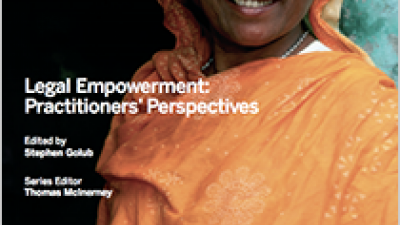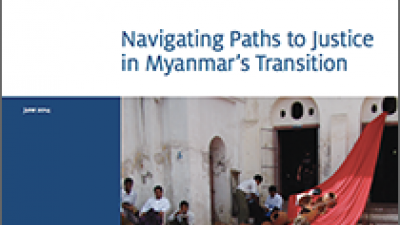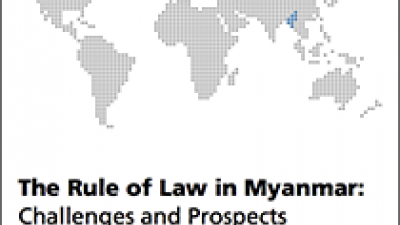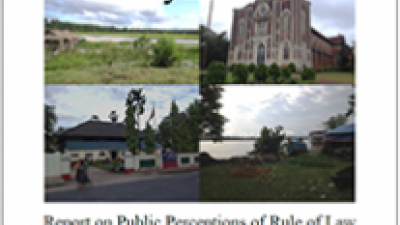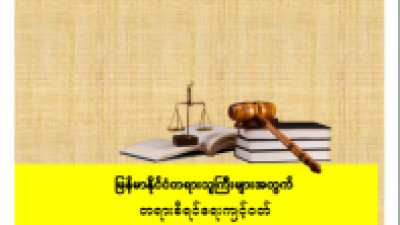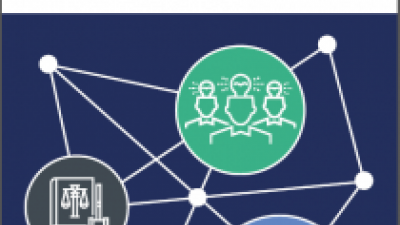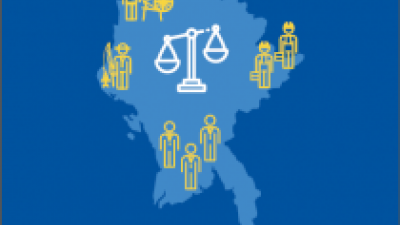-
In December 2014, the Supreme Court of the Union published a three-year strategic plan for the judiciary. It includes five key performance areas: 1) Protect Public Access; 2) Promote Public Awareness...
Advancing Justice Together: Judiciary Strategic Plan 2015 – 2017
In December 2014, the Supreme Court of the Union published a three-year strategic plan for the judiciary. It includes five key performance areas: 1) Protect Public Access; 2) Promote Public Awareness; 3) Enhance Judicial Independence and Accountability; 4) Ensure Equality, Fairness, and Integrity of the Judiciary; and 5) Strengthen Efficiency and Timeliness of Case Processing. Year by year plans and reports on their implementation are available on the Supreme Court’s website.
-
Between Fear and Hope: Challenges and Opportunities for Strengthening the Rule of Law and Access to Justice in Myanmar
This September 2014 report by the Myanmar Legal Aid Network (MLAW) draws on in-depth qualitative research in Yangon Region and Mon State, identifying four priority justice concerns from respondents.
-
This May 2016 handbook by the International Commission of Jurists provides a legal analysis of the writ of habeas corpus in international law and within Myanmar’s legal framework, and concludes with...
ICJ: Handbook on Habeas Corpus in Myanmar
This May 2016 handbook by the International Commission of Jurists provides a legal analysis of the writ of habeas corpus in international law and within Myanmar’s legal framework, and concludes with recommendations for the ongoing reform process.
-
This 2010 publication from the International Development Law Organization is a rich compilation of detailed case studies on legal empowerment around the world. Topics range from land rights to...
IDLO: Legal Empowerment, Practitioners’ Perspectives
This 2010 publication from the International Development Law Organization is a rich compilation of detailed case studies on legal empowerment around the world. Topics range from land rights to livelihoods to discrimination.
-
This July 2014 article by the International Center for Transitional Justice argues that dealing with past abuses in Myanmar is essential to achieving progress on the peace process and economic...
ICTJ: Navigating Paths to Justice in Myanmar’s Transition
This July 2014 article by the International Center for Transitional Justice argues that dealing with past abuses in Myanmar is essential to achieving progress on the peace process and economic development. It concludes with recommendations on how to incorporate transitional justice into programmatic reform and development efforts.
-
This December 2012 report by the International Bar Association’s Human Rights Institute draws on interviews with over 100 participants by IBAHRI members in Yangon, Mandalay, Nay Pyi Taw, and Bago,...
IBAHRI The Rule of Law in Myanmar: Challenges and Prospects
This December 2012 report by the International Bar Association’s Human Rights Institute draws on interviews with over 100 participants by IBAHRI members in Yangon, Mandalay, Nay Pyi Taw, and Bago, including senior politicians, civil society activists, judges, lawyers, diplomats, and INGO workers. Much of its analysis remains relevant today.
-
The British Council Myanmar and CSO Loka Ahlinn co-administered the Capacity Building and Rule of Law Promotion Project, which aimed to develop a network of CSOs and legal professionals to raise...
British Council & Loka Ahlinn Report on Public Perceptions of Rule of Law
The British Council Myanmar and CSO Loka Ahlinn co-administered the Capacity Building and Rule of Law Promotion Project, which aimed to develop a network of CSOs and legal professionals to raise awareness of legal and human rights. This August 2014 report draws on quantitative and qualitative research on public perceptions of rule of law effectiveness in Mawlamyaing, Bogalay, and Dawei townships. It concludes with recommendations for how to advance reform through advocacy and policy action.
-
The Supreme court of the Republic of the Union of Myanmar published the Code of Judicial Ethics for Myanmar Judges on 2nd August 2017 in Nay Pyi Taw , available in Myanmar language. U Htun Htun Oo,...
The Code of Judicial Ethics for Myanmar Judges
The Supreme court of the Republic of the Union of Myanmar published the Code of Judicial Ethics for Myanmar Judges on 2nd August 2017 in Nay Pyi Taw , available in Myanmar language. U Htun Htun Oo, Hon. Chief Justice said at the launch of the Code, “it is aiming at providing a standard to be able to assess the judicial activities by the Executive and Legislative branches of the State, and by the lawyers and the public. We eagerly anticipate that not only the Judges and Judicial Officers but also all the stakeholders in the judicial sector will be able to comprehend more about the judicial transactions and be able to contribute to developing a fair and strong judicial system.”
-
This January 2017 report from ROLE UK gives a practical overview on how to conduct a political economy analysis in the legal sector. Political economy dynamics “determine the distribution of power...
Political Economy Analysis – Guidance for Legal Technical Assistance
This January 2017 report from ROLE UK gives a practical overview on how to conduct a political economy analysis in the legal sector. Political economy dynamics “determine the distribution of power and resources” and are thus essential to understanding how to sustainably support role of law and justice system reforms.
-
Myanmar is currently undergoing rapid transformation. The legal framework regulating employment in Myanmar is found in a variety of different Laws and Rules enacted over the last century. This Guide...
ILO Guide to Myanmar Labour Law
Myanmar is currently undergoing rapid transformation. The legal framework regulating employment in Myanmar is found in a variety of different Laws and Rules enacted over the last century. This Guide brings together many of the sources of Myanmar labour law in a single, user-friendly guide. The Guide also provides useful information on the International Core Labour Standards to promote and inspire good practice on employment and labour in Myanmar.
